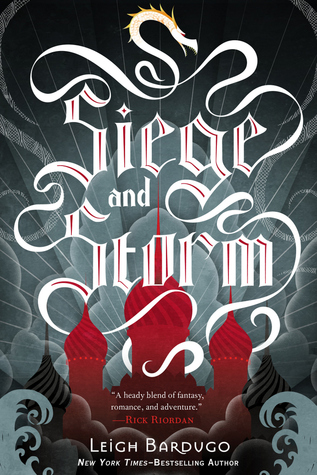 I wasn't super psyched about the first volume of the Grisha series, but I held out hope for the other volumes. In this second book, Alina and Mal are fleeing Ravka and the Darkling--until they're not. And soon, Alina finds herself with a second amplifier and hopes for a third, control of the Second Army, and no idea where the Darkling actually is, but a sense that all is not going to go well.
I wasn't super psyched about the first volume of the Grisha series, but I held out hope for the other volumes. In this second book, Alina and Mal are fleeing Ravka and the Darkling--until they're not. And soon, Alina finds herself with a second amplifier and hopes for a third, control of the Second Army, and no idea where the Darkling actually is, but a sense that all is not going to go well.There's a split in my opinion on this book. On one hand, there's definitely a case of second-book syndrome going on here. Not a lot happens in it other than Mal and Alina fighting--and more on that later. On the other hand, I felt like this book was a bit better than the first because the symbolism wasn't quite as heavy-handed and Bardugo didn't do as much to deliberately manipulate readers and without much art. The "dark is bad, light is good" dynamic is still there, but because the Darkling isn't present on the page for most of the book, it's not played up as much.
Instead, the focus of this book is largely the relationship between Alina and Mal. I'm not sure why this is a relationship that Bardugo continues to push, because it's clearly very toxic. Mal can't accept that Alina has a moral compass that doesn't always align with personal desires (his or her own) but Alina clings to him and refuses to let go of some dream of them being together, because they've known each other their entire lives. Note: knowing someone your entire life does not automatically make them a suitable romantic partner. Alina pushes away another potential romantic interest who, though he has his own motivations, is probably also much better for her, just because she's so wrapped up in Mal, who is downright nasty to her for most of the book.
Bardugo did add in some interesting supporting characters in this book, mainly in the form of Sturmhond/Nikolai and his crew. This is exactly the sort of dynamic that I think this book needed. Nikolai is a very strong character and I hope we see more of him in the final book, though I suspect that it's going to be a lot of Mal and Alina on their own. Seeing Grisha who weren't actually part of the Grisha hierarchy was also interesting, and made sense; after all, if Grisha are born in all nations in this world but are only welcomed in Ravka, it makes sense that not all of them would run away to join the Second Army. I do wish we knew a bit more about this whole dynamic, because Ravka seems like such an isolated country and that's really not how countries work, but I guess that's not something Bardugo really plans on going into, at least not in this series.
So, yes--a stronger book than the second one, and it gives me hope for the third.
3.5 stars out of 5.
No comments:
Post a Comment